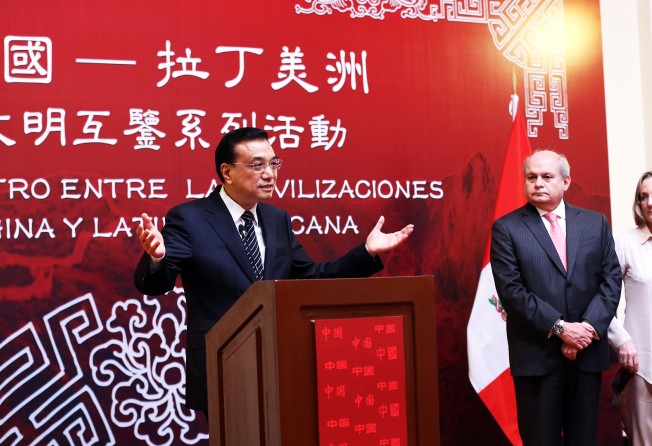Caution in Latin America over deals with China
As premier urges Chinese businesses to work together, analysts raise questions over past deals that have still not been implemented

Chinese enterprises in Peru should support each other in expanding their overseas operations, Premier Li Keqiang said yesterday as he continued a tour of Latin America that has seen China sign up to investments worth tens of billions of dollars.
Speaking in Lima, Li urged mining and manufacturing companies to coordinate with financial institutions to achieve common development goals, and said Beijing would strengthen its ties with Peru to better facilitate Chinese companies.
But his comments - which also called on Chinese companies to take on social responsibilities and maintain a "harmonious relationship" with local communities, came amid questions from some local media and analysts surrounding the reported US$53 billion worth of deals he signed with Brazil last week.
"We need to take these potential investments with caution. Some of the projects announced [on this trip] have already been publicised in the past, but were not implemented," said Larissa Wachholz, who works in Brasilia for Vallya, a consultancy specialising in China-Brazil deals.
One of the projects which has created controversy is a 4,400km railway line connecting the Atlantic and the Pacific oceans through Brazil and Peru.
Chinese state-owned companies (SOEs) have agreed to finance and carry out feasibility studies in the coming months.
But Renato Pavan, an expert on transport integration in Latin America, said the railway was an old idea which had "no chance" of being implemented.
"It is unviable geographically, economically and commercially. About US$13 billion should be invested to make it possible and, compared to current sea routes, the distance between the exporting ports and China would be shortened only 2,000km. This is just a political issue," said Pavan.
He said Chinese SOEs would not be able to substantially cut the costs of building the railway by employing Chinese workers. "About 35 very long tunnels would need to be dug, which demands mainly technology. Labour represents only 1 per cent of the total budget," he said.
Trade with China, which has boomed over the past decade, has recently become more controversial for raw material exporters such as Brazil, Peru and Chile.
This is mainly because China's economic slowdown and the fall in commodity prices on international markets have created painful trade deficits. Brazil, for instance, which in 2011 ran a US$20 billion surplus with China, last year had a US$4 billion deficit which will increase this year. Peru, which exports massive amounts of copper, iron ore and zinc to China, has also had a trade deficit since 2013.
This week Li renewed China's promises to buy more value-added products, such as Brazilian jet planes, and announced the resumption of beef imports from Brazil, suspended since 2012. "This was already promised by [President] Xi Jinping during his visit to Brazil last year, but it has not been implemented so far. Brazilian meat companies have expressed anxiety and frustration," Wachholz said.
Watch: Premier Li Keqiang and Brazilian president Dilma Rousseff unveil several agreements